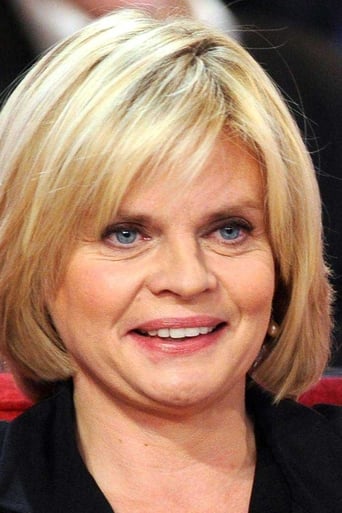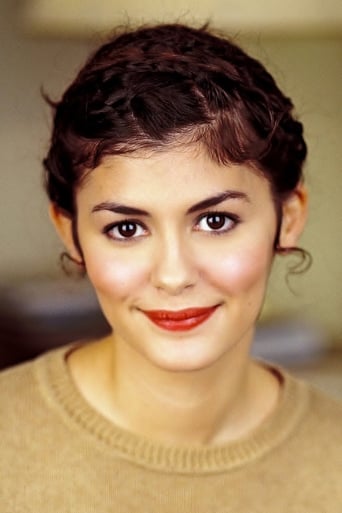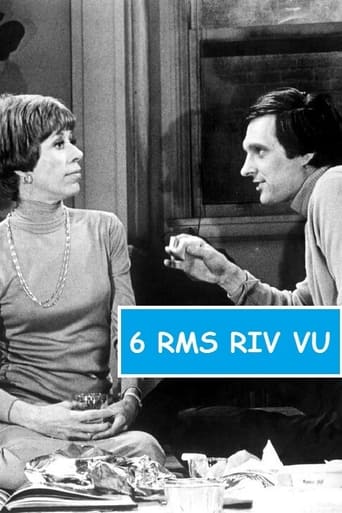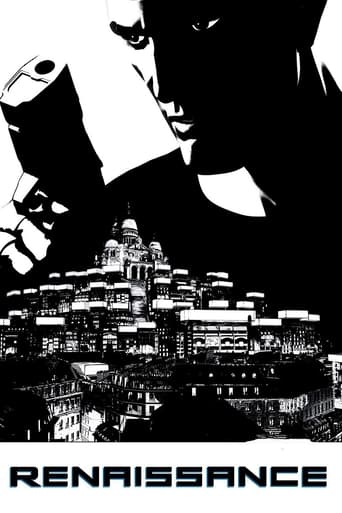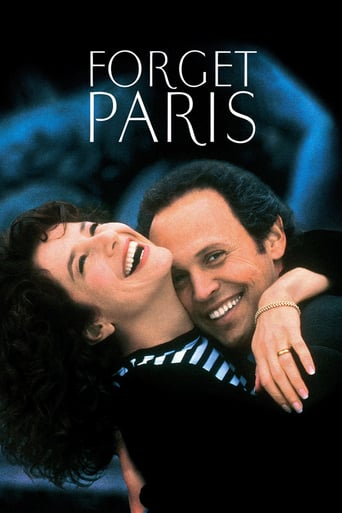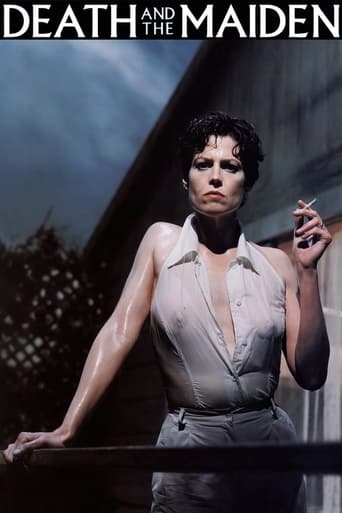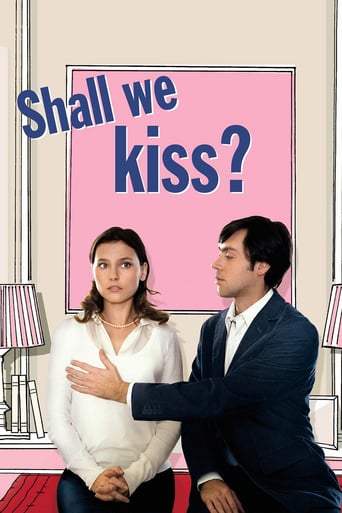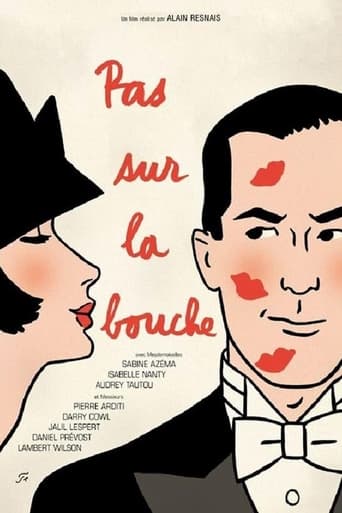
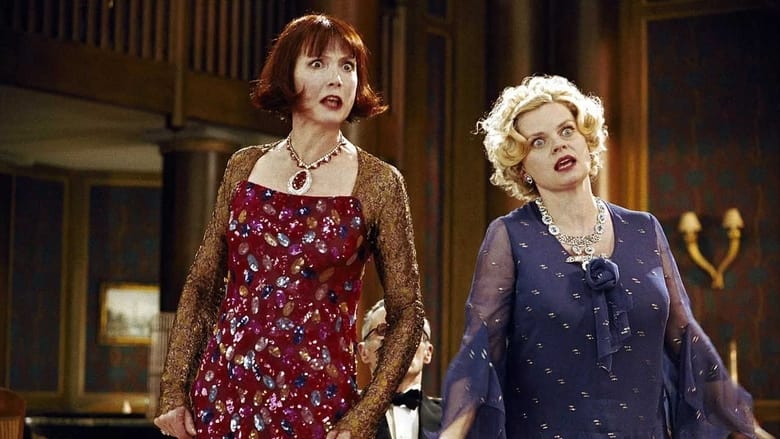
Not on the Lips (2003)
A musical drawing room farce set in Paris in October, 1925. Gilberte, in middle-age, flirts with men but loves her husband Georges, wishing he were more demonstrative. He's negotiating a deal with an American, Eric Thomson, who turns out to be Gilberte's first husband from an annulled and secret stateside marriage. Along with her sister Arlette, Gilberte begs Eric not to tell Georges about the marriage. Meanwhile, a young artist, Charly, pursues Gilberte while Arlette tries to match him with the young Huguette, who loves him. Will Eric play along or try to re-win Gilberte's affection? Can Gilberte play one off against another? And who will manage to kiss whom on the lips?
Watch Trailer
Cast
Similar titles

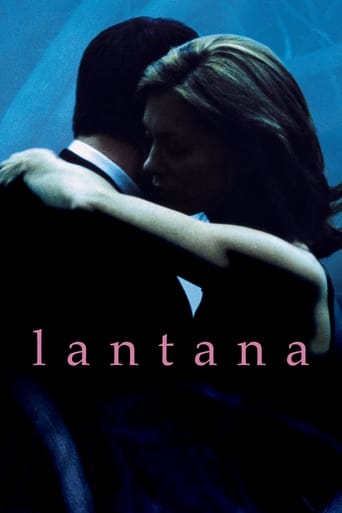

Reviews
Undescribable Perfection
Good movie, but best of all time? Hardly . . .
A lot of fun.
Exactly the movie you think it is, but not the movie you want it to be.
This film is about a woman whose husband is not aware that she married an American guy before. Chaos breaks out when the American husband is invited to their home.The film takes place entirely inside the beautiful residence of a rich couple. Sets are lavish, costumes are dazzlingly beautiful as a result. The songs are fun and got this nostalgic feel to it. The entangled relationships between the seven characters are entertaining to watch, and they kept me intrigued as to how things will turn out between them. Even though it was not easy to catch up with the subtitles, it was still delightful to watch."Not on the Lips" is a fun, light hearted, old style musical. I was told that this style is called "operetta", and I am liking my first exposure to operetta.
What was this? Why was I here? The trailer was sophisticatedly blasé suggesting that Alain Resnais had cast Audrey (Amélie) Tautou to target the American market, and that lantern-jawed Jalil Lespert would add to the film's swoon factor. So, expecting a saccharin romcom I had failed to do my homework on Google and I woke up three minutes into the film to a startling revelation.'It's an operetta! No one told me!'In our thrillseeking contemporary culture accelerated by Karen O's screams and the mentholated bandwidth of broadband wifi, people could question the 2-hour time investment required to watch a bigscreen adaptation of an obscure French-language three-act operetta which was first performed in 1925. Especially one which glorifies the frivolity of the Parisian jetset via music and rhyme, replaces location shots with deliberately stagey sets, and conceals a skeletal plot under the billowing skirts of witty ditties and fully-orchestrated vignettes.The core tune, 'Pas Sur La Bouche', is typical of the film as a whole. It recounts how Eric Thomson (Lambert Wilson), a 'pudibond' (prudish) American businessmen, is too pent up to kiss girls on the lips. Four nubile sirens entreaty the fleeing entrepreneur for a covert snog, and through basic studio boomwork we are subjected to half-length shots of turgid choreography as the frigid, bespectacled yank retreats up the successive tiers of a grandstand. Does Mr Thomson suddenly succumb to the onslaught, staging an impromptu gangbang with the four nymphettes and confessing his concupiscence to a nearby priest? Of course not. It's 1925. Eric Thomson has never heard of Viagra. This is an operetta.Which is fine if you're about 115 years old and you're into the genre. 'Pas Sur La Bouche' certainly seemed like a jolly, nostalgic outing for its dapper actors especially the slinky, hammy Sabine Azéma and the neurotic, unkempt Isabelle Nanty. Wouldn't we all leap at the chance to get dolled up in chintzy art deco garb and to dish up outmoded verbal conceits - in song - to the cinemagoing masses? The plot is the kind of open-door/close-door farce that works well in theatre. Wealthy Socialite Gilberte (Azéma) hides her former marriage from Magnate husband Valandray (Pierre Arditi). Socialite flirts with Beau (Jalil Lespert), a struggling artist. Beau is courted by Belle (Audrey Tautou) yet he prefers Socialite. Belle confides in Socialite's Spinster sister (Isabelle Nanty), who assumes the role of matchmaker. Socialite's American ex-husband (Lambert Wilson) returns to buy Magnate's business. High jinks ensue. After much silliness all ends well.So far, so Molière. The songs (by librettist André Bardé and Maurice Yvain, the Tim Rice and Andrew Lloyd-Webber of their day) are jaunty and innocuous. They offer plenty of scope for the sort of theatrical winks and to-camera headtwists occasionally glimpsed in Abba videos. The standout tracklist below - with rhyming summaries to replace what can only be approximate subtitles - is an appeal to a less faithful rendering of the vaudeville format in future."Choeur d'entrée"-Rich girls detail their passions for retail, fashions-Subplot rake is overt about his chasing of skirt-Magnate lets rip with his pet discourse: that devil, divorce."Comme j'aimerais mon mari"-Socialite lauds the botox invigoration of toyboy flirtation-Reveals her projection of six-packed ab onto spouse's flab"Gilberte et Valandray"-Socialite and Magnate engage in kitchen cajoling during lobster-boiling-A warbled feuilleton about riches, kisses, dresses, bouillon"Quand On N'a Pas Ce Que L'on Aime"-Wallflowers debunk the inconstancy of hunks-Hearts flutter, lips quiver, Spinster splutters, Belle shivers"Pas Sur La Bouche"-Stiff, suited yank avoids lolita hanky-pank "Sur Le Quai Malaquais"-Beau and Belle muse their future caress at a Seine-side address-Dénouement will follow, with entire cast in towAnd that's about it. Burst into tears, not song. If you want a timewarp back to lavish musicals about Paris, dust off some old videos of Funny Face or Gigi and tap the heels of your black-and-white correspondent's shoes to Maurice Chevalier's 'Sank 'eavens for lee-toll gulls'. Or at least rent Moulin Rouge. It seems that the octogenarian Alain Resnais took heart from the box office success of 'Huit Femmes', François Ozon's singing, dancing allstar vehicle aimed purely at humiliating France's bouffoned-and-tucked grandes actrices. And what with the cinematic euros pouring into musicals of late - Topsy Turvy, Moulin Rouge, Chicago surely this operetta would provide succour to French audiences sickened by the rewind rape scenes of 'Irreversible' or the porno violence of 'Baise-Moi'? With that bobbed actress out of Amélie, it might even have turned a profit.
Alain Resnais was extremely comfortable with opulence in 'Last Year at Marienbad', and Alain Robbe-Grillet felt right at home in this, with his serialized writing. I hadn't thought that much about this taste for luxury till I saw his 2003 film of Andre Barde's 1925 operetta, 'Pas Sur la Bouche.'This is easily one of the lightest, most exquisite filmed musicals ever made, and quite as unexpected a thing as possible in this age. There are some modern aspects: the luxury is greater luxury than in the past, but does not ever seem like gluttony; it is not like an exhibition of 100 Burne-Jones paintings, for example, which was about the number in a 1999 exhibition at the Metropolitan Museum here--and that many at once makes one fairly sick.All of the songs are charming, and even the one ugly one is (but only because it is only one; it is truly unpleasant to the ear and could have been styled better even with such meager material): this is the song that Eric Thomson (played by Lambert Wilson) sings with Arlette (Isabelle Nanty) when he is discovered to be doing business with George Valandray (Pierre Arditi) as well as being Valandray's wife Gilberte's (Sabine Azema) first husband (their American-produced marriage was not recognized upon her return to France, although her reasons for dissatisfaction with him are not made entirely clear). Thomson's French seems to have disappeared and he keeps responding to Arlette with "Whaddya say?" and "Whaddya know?" and this is irritating and does not even particularly form a purposeful dissonance with the rest of the graceful and casually elegant Parisian-style music. However, it is followed quickly by a group song when everyone is about to sit down to a "simple meal," which looks rather more as if composed by Escoffier or Pelleprat, and, very campily, Thomson's French reappears as if by magic as he joins all the French people in their tuneful paean to the repast they will consume (in silence, one wishes, but cannot hope for.) This "magical device" is subtle enough to be a considerable improvement over the "spontaneous" bursting into song by the wedding party at "I Say a Little Prayer for You" in 'My Best Friend's Wedding.'The luscious orchestrations of the songs remind one of the Marguerite Monnot-Alexandre Breffort score for 'Irma La Douce'--as in "Dis-donc," and decades of this kind of sound at the Casino de Paris, at the Folies Bergere.There is a lot of red, many plummy reds, in the lavish sets, but it is not discordant. One does notice that the film is almost entirely set in interiors, and the courtyard of witchlike (and sublimely hilarious) Mme. Foin (Darry Cowl) is about the only contact with a little remembrance of sky one sees; but this is usual for sex farce.Everyone is involved with everyone, and it's so silly that only in the viewing does it have life; in the retelling it doesn't have a grain of substance, so I am not going to bother. The players are uniformly characterful and theatrical, and Sabine Azema is superlatively middle-aged-sexy and spirited, while Jalil Lespert has the biggest Frenchest face since Maurice Chevalier: He's truly a major talent. Audrey Tautou seems to be imitating Twiggy in 'the Boyfriend' sometimes, which is cool enough.
Alain Resnais, darling of the avant garde, continues his journey back to the mainstream and, let's face it, BEYOND the mainstream, with this lush photography of even lusher decors and costumes by Vanity Fair out of Vogue. Nothing wrong with that, of course, if you can get past the hypocrisy. Here we have, set in the twenties, that old standby the second husband who has to cut a deal with his wife's ex, a sister-in-law and two ingenues thrown in for good measure with everyone breaking into song at the drop of a lorgnette. Pierre Arditi does suave as if he invented it and whether by design or accident contrives to sound like Charles Boyer on medication;Mrs. Resnais, Sabine Azema does style as effortlessly as Astaire and Audrey Tatou has cornered the current market in gorgeous. This should be enough to either encourage or deter you. 6/10

